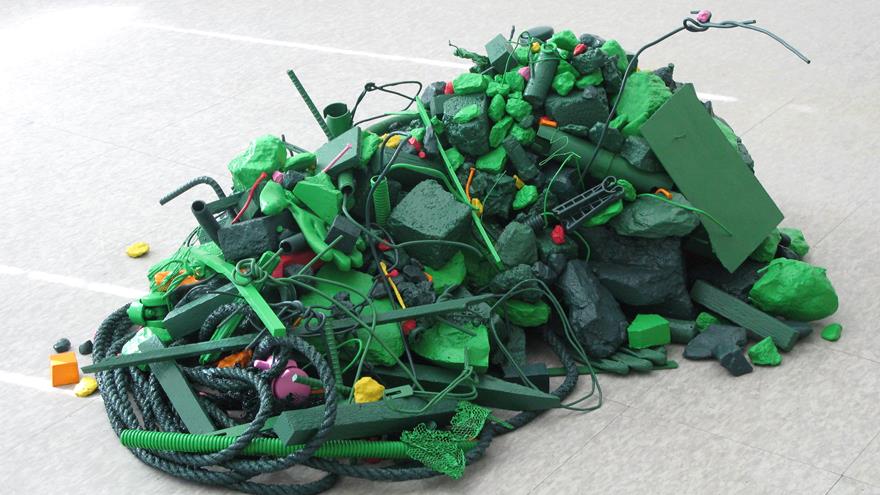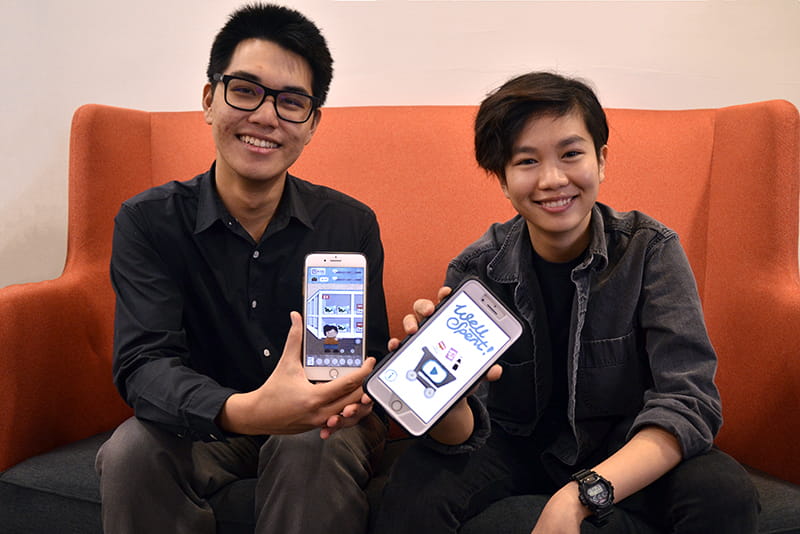Drexel Game Design Students Win Big With ‘Well Spent’

- Drexel’s Pearlstein Gallery Offers Spring Exhibitions Centered on the Healing Properties of Art and Creative Works
- The First Exhibition of Contemporary Nepali Artists in the U.S. Debuts in Drexel’s Pearlstein Gallery
- Entrepreneurial Game Studio's App Takes Stanzas to the Streets
- Chasing the Dragon: China in the Western Imagination on Display at Drexel’s Fox Historic Costume Collection

Tara Boonngamanong and Note Nuchprayoon came into the current winter term at Drexel University with a little more capital and a lot more work to do on their current passion project.
That’s because the second-year game design students won first place and $20,000 in the second round of the U.S. Department of Health and Human Services’ (HHS) game challenge for their aesthetically pleasing obesity prevention game, “Well Spent.” And, if they complete the game in a six-month timeframe and continue to wow the competition’s judges, they will be eligible for significant additional funding.
The idea to enter the contest came about when Boonngamanong was looking around for scholarships and contests where she could flex her game-design muscles.
The idea to enter the contest came about when Boonngamanong was looking around for scholarships and contests where she could flex her game-design muscles.
They were joined by recent University of Pennsylvania graduate Ila Krishna Kumar, who assists with user research and testing.
With the game challenge objective of creating a game focused on obesity prevention or weight control for women and girls, the team wanted to make sure their proposed game took both a unique and an inclusive approach.
“Our game doesn’t really teach the player how to eat healthy. That’s not the goal,” Boonngamanong said. “But we do train them to look at nutrition labels, stuff like that. Our main goal is to decrease stigma around obesity, and be like ‘Hey, there are a lot of factors that go into someone being obese.’ There’s a link between low-income communities and obesity.”
“Well Spent” is a grocery shopping game in which the player must balance money, time and healthy eating. What sets it apart are both the aesthetics and the fact that it does not capitalize on the stigmatized ways combating obesity has generally been approached.
“I think one thing for sure is a lot of educational games are not pretty at all. [They’re] boring, very boxy looking, and it’s not fun,” Boonngamanong said. “I think our game would be somewhat fun, hopefully, but for sure our art is very strong. So, we can show that an educational game can be beautiful too.”
“We’re also being inclusive of the low-income median,” Nuchprayoon added. “I feel like our game will be able to reach a wider audience and make more impact rather than something that has more general information that most people know, but it’s not adaptable to their real-life situation.”
These concepts certainly impressed judges along the way to bringing “Well Spent” to life, but doing so has also been hard work for these second-year students. After becoming one of 10 teams — most of which were composed of professors or PhD students — to advance to the second round of the challenge, they gave a 30-minute presentation of a “visual walkthrough” of the game to judges in Washington, DC. This awarded them the $20,000 in prize money and the chance to advance to round three, but also the responsibility to build out their game in only a six-month timeframe. The team has recently hired an additional developer, and after interviewing candidates from across the world, settled on hiring a Drexel alum.
"We were happy when we got past phase 1,” Boonngamanong said. “We were like ‘Oh my god, we did it!’ But then once we got past phase 2, we were like ‘Oh no, we did it!’ she added with a laugh.
Both students agreed that Westphal College of Media Arts & Design Assistant Teaching Professor and Game Design & Production Program Director Robert Lloyd has been very helpful to them throughout the game challenge. He is even allowing them to do an independent study to receive school credit as they work through phase three and bring their game to fruition.
Lloyd said it’s been a pleasure to help his students focus their approach to the project and develop the food desert aspect that helped set “Well Spent” apart to judges.
“Tara and Note responded to this deeper challenge beautifully, adding layers to their game about the daily tradeoffs that people must make to get access to healthier choices and the costs they impose,” Lloyd said. “I was thrilled when the HHS rewarded them for this insight. The judges loved the inclusion of stigma reduction, realism and acknowledgment of the costs in time and money to reach stores with healthier choices.”
Lloyd added that games can help fill educational voids that other mediums can’t because they can help get important signals through the noise that is today’s constant, demanding daily media landscape.
“Games that allow us to escape the noise of the day are a welcome refuge,” he said. “Games are complex systems, like life, but they are designed to reward the player and provide a type of comfort by having actual solutions to the problems they pose, unlike life. If that game can also entertain us with an important message — slipping in a bit of broccoli in the sugar escape — then the game makers have done a good job.”
Boonngamanong said that the experiential nature of games can also help with retention.
“If they have to go through levels of a different story, I feel like they will remember the story more,” she said.
“Storytelling is a very strong pull for anything,” Nuchprayoon added.
Even though the next few months may be a little hectic, Boonngamanong and Nuchprayoon would encourage all students to seek opportunities like this, and get a friend to help.
“If you have an idea, go for it. Don’t wait for a class to happen,” Boonngamanong said. “For this project, it felt like something we would never reach, but somehow we made it through the last phase.”
“It’s one thing to say as a student, ‘I have an idea!’ and another to actually deliver,” added Lloyd. “That’s part of what sets Tara and Note apart. They are willing and able to deliver on their promises and have the talent and curiosity to create compelling results.”
In This Article
Drexel News is produced by
University Marketing and Communications.